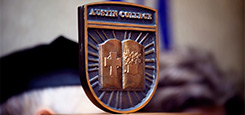Nearly $13 million gift is Austin College’s largest
A gift of nearly $13 million from the estate of William Windsor Richardson of Sherman has provided endowment funds for four new faculty chairs and their related programs at Austin College. Richardson died in 2017, and when his substantial estate was settled recently, the College received more than $12.8 million. Faculty members were installed in the chairs this spring.
“This generous gift, among the largest in Austin College history, ensures the continuation of important new programs that span the breadth and depth of our academic program,” said President Steven P. O’Day. “From the sciences and social sciences, to the humanities, languages, and the arts, each endowed program provides a link to a broad-based personalized education that is rooted in the liberal arts and reinforced through real-world experiences.”
William W. Richardson
William W. “Bill” Richardson was a member of the Austin College Class of 1964 and represented a long family tradition of dedicated advocacy for the College. Both his grandfather, W.C. Windsor, and his mother, Gertrude Windsor Richardson, served on the Board of Trustees, his grandfather as chair in the 1950s during the Guerrant and Moseley presidencies.
The Windsor and Richardson names have long been memorialized through numerous scholarships, awards, and lectures at Austin College, including the Mr. and Mrs. W.C. Windsor Presidential Scholarship and the Will Mann Richardson Lectureships and Seminars in the Social Sciences. In 1961, the family built Windsor House at the corner of Grand and College Streets as a gift to the College in memory of the former board chair. The house served as the home of the dean of the College for more than 20 years, and now is home to the vice president for Student Affairs.
One of the most evident signs of the family’s legacy was created for the 125th anniversary celebration of the College. Windsor Mall, the tree-lined, east-west walkway of the campus and used by students and faculty every day, connected the Trustee Court and Kappa Fountain to Jonsson Fountains and Plaza on the west end of campus. Windsor Mall was dedicated in 1975.
Bill Richardson developed his own passion for Austin College. After his time as a student, he worked for the College for the next 15 years in various positions, finally as assistant to the vice president of Financial Affairs. He next formed a business consultancy with Austin College President John D. Moseley that continued until the president’s retirement from the College in 1981. At that time, Richardson began to concentrate his work efforts on family interests, though he remained a dedicated supporter of the College and its students and faculty.
In his lifetime, Richardson added to the list of Windsor and Richardson scholarships and lectures on campus and supported other major initiatives, including additions to immediate-use scholarships and the Robert J. and Mary Wright Campus Center. Richardson’s devotion to the Moseleys led to his support of the College Green honoring John D. and Sara Bernice Moseley and Distinguished Faculty, and a Sara Bernice Moseley Endowed Scholarship.
The Estate Gift
The four new Richardson endowed faculty chairs awarded this spring support associated Austin College programs that have extended the boundaries of learning across the Humanities, Sciences, and Social Sciences at the College. The recently developed programs are designed to guide students in identifying connections across disciplines and in expanding ways in which their learning at Austin College extends beyond the classroom into their professional and personal lives.
The new chairs and the faculty installed:
- The Richardson Chair for the Center for Research, Experience, & Transformative Education (CREATE)— Lance Barton, professor of biology and director of CREATE
- The Richardson Chair for the Philosophy, Politics, and Economics Program— Mark Hebert, associate professor of philosophy and active in the Philosophy, Politics, and Economics (PPE) Program
- The Richardson Chair for the Professionalism and the Humanities (PATH) Leadership Program— Jennifer Johnson-Cooper, associate professor of Chinese and director of the PATH Program
- The Richardson Chair for the STEM Teaching And Research (STAR) Leadership program— John Richardson, associate professor of chemistry and director of the STAR Leadership Program.
“The Richardson gift ensures that opportunities for students to meaningfully engage in the very core of our liberal arts and sciences education will be preserved in perpetuity,” said Beth Gill, vice president for Academic Affairs and dean of the faculty. “The impact of the gift will be felt year after year, generation after generation.”
Active Questioning
Each of the Richardson Chairs is, on paper, “The Richardson Chair of Skeptical Thought” though that title is not used in common reference. The donor expressed the idea of the naming, imagining the chairs with the motto “I doubt that.” He envisioned that faculty chair holders “would habitually question those invisible dominant concepts” around them. “Skepticism is a healthy habit for a healthy mind,” he said. “It ought to be the first step in listening and learning.” Richardson explained that he hoped students would pursue new ways to think about old problems, to take a step back and see if an attack from a different angle would be successful—to do what he said John D Moseley called “thinking otherwise.”
“These programs certainly represent active questioning and the examination of issues and ideas to discern validity and consider differing viewpoints,” Gill said. “Students learn how to grapple with hard, enduring questions mirroring the messiness of life. In short, they learn how to think, not just what to think. Beyond the continued academic and experiential education of future scientists, artists, musicians, entrepreneurs, and of academic, business, and community leaders, each of these programs prepares our students to make the world better.”
Austin College, a private national liberal arts college located north of Dallas in Sherman, Texas, has earned a reputation for excellence in academic preparation, international study, pre-professional foundations, leadership development, committed faculty, and hands-on, adventurous learning opportunities. One of 40 schools profiled in Loren Pope’s influential book Colleges That Change Lives, Austin College boasts a welcoming community that embraces diversity and individuality, with more than 50 percent of students identifying as persons of color. The residential student body of approximately 1,300 students and more than 100 expert faculty members allow a 13:1 student-faculty ratio and personalized attention. Related by covenant to the Presbyterian Church (USA), Austin College cultivates an inclusive atmosphere that supports students’ faith journeys regardless of religious tradition. The College, founded in 1849, is the oldest institution of higher education in Texas operating under original name and charter.



